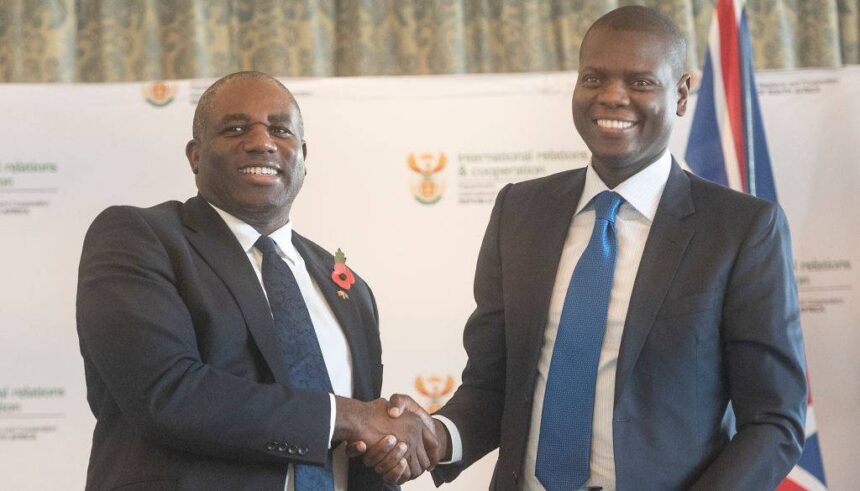South African Minister Ronald Lamola recently hosted UK Foreign Secretary David Lammy in Cape Town to discuss strengthening relations between the two countries. The meeting took place at Table Bay Hotel and focused on various global issues, including the ongoing conflict between Russia and Ukraine.
During their meeting, Lamola expressed South Africa’s interest in playing a role in facilitating peace talks between Moscow and Kyiv. He highlighted the country’s non-alignment position as an opportunity to act as a bridge between the two nations. Lamola also shared feedback from talks with Ukrainian officials and expressed hope for direct negotiations to end the 30-month war.
Lammy, on the other hand, raised concerns about North Korean troops being sent to Russia to fight in Ukraine. This development was seen as a dangerous escalation of the conflict by Lammy and other members of the G7, including the United States, Japan, Italy, Britain, Germany, France, and Canada, as well as South Korea, Australia, and New Zealand.
The discussion also touched on the recent Brics summit in Kazan, where President Cyril Ramaphosa sought to engage with Russian President Vladimir Putin on the conflict in Ukraine. Despite efforts to encourage Putin to meet with Ukrainian President Volodymyr Zelenskiy, progress was limited as Putin remained silent on calls for peace made by other world leaders.
Lammy and Lamola also addressed the issue of the Middle East, including South Africa’s pending genocide case against Israel at the International Court of Justice (ICJ). South Africa recently filed a memorandum outlining its case against Israel, citing violations of the Genocide Convention. Lammy noted that the UK’s stance on Israel has shifted under the new Labour government, emphasizing the importance of international humanitarian law in their decision-making process.
Additionally, the two ministers discussed the reform of the UN Security Council, with the UK currently holding the rotating chair. Both Lamola and Lammy highlighted the importance of ongoing dialogue and cooperation on global issues to promote peace and stability in the region and beyond. The issue of Africa’s representation on the UN Security Council has been a topic of discussion, with the current proposal suggesting that the continent would receive two permanent seats without veto powers. However, there is a demand for at least two permanent seats with full veto rights. The UK government is carefully considering this matter and is keen to understand the position of other members of the Security Council, such as Russia and China, who have previously opposed expansion.
South Africa and Britain are aligned on the issue of Africa’s representation on the Security Council, with South African Minister Lamola stating that there is room for improvement in trade relations between the two countries. Despite being the UK’s largest trade partner in Africa, bilateral trade has slightly decreased over the past year.
The UK government plans to use its upcoming presidency of the G20 to push for reforms in multilateral institutions to give more influence to the Global South. This includes lobbying powerful member states for more permanent seats for African nations on the Security Council, in line with the 2005 Ezulwini Consensus.
The UK’s foreign policy prioritizes strengthening ties with the Global South, especially in the face of increased interest from Russia and China in the continent. Minister Lammy emphasized the importance of the Commonwealth in fostering closer cooperation with African partners.
The UK government aims to build respectful partnerships with African countries, listening to their needs and fostering relationships for mutual growth. This strategic approach includes signing a partnership accord with Nigeria to promote growth, prosperity, and opportunities for both British and African citizens.
In conclusion, the UK government’s focus on building stronger ties with African nations and advocating for Africa’s representation on the Security Council reflects its commitment to promoting growth, prosperity, and cooperation between the UK and its African partners.







